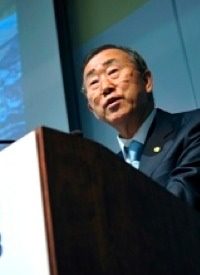
Confronted by a negotiation process that some are characterizing as “walking in wet sand,” UN Secretary-General Ban Ki-moon has decided to get things moving on the environment by shifting his rhetoric into “Chicken Little” mode. In an article that takes its title from Ban’s histrionics — “We are heading toward an abyss” — the Associated Press has responded to the call to arms with a one-sided repetition of the secretary-general’s talking points.
The context for the latest round of climate-change handwringing is the meeting in Geneva preparing for December’s conference in Copenhagen, which is aimed at a massive expansion on the Kyoto Protocol. The concern expressed by the AP is that
Only limited progress in the climate talks has been made for the meeting to hammer out a new accord to replace the 1997 Kyoto Protocol on reducing the gases blamed for global warming.
Meanwhile, climate change is advancing.
"Our foot is stuck on the accelerator and we are heading towards an abyss," said Ban, warning that climate change could spell widespread economic disaster.
He noted that he had just visited the Arctic and was alarmed by what he saw.
"The Arctic is warming faster than anywhere else on Earth," Ban said. "It may be ice-free by 2030."
What keeps it all particularly confusing is that the environmental alarmists cannot keep their story straight about precisely which abyss we are heading for — is it a new Ice Age of the 1970s, or is is a Ban’s meltdown, or is it, as in the 2004 movie The Day after Tomorrow, somehow inexplicably both? At least the change in nomenclature from “global warming” to the more amorphous “climate change” will allow future ideological flexibility.
One thing remains constant, however: whether we are going to freeze or melt, the solution is more government. In the words of the AP article, “The climate conference in Geneva is aimed at providing ways for the world to cope with global warming that will occur because of greenhouse gases already in the atmosphere, regardless of what the Copenhagen meeting achieves.” What are these global coping skills? A document nearly seven times longer than the Kyoto Protocol, and one which is far more comprehensive in scope. Thus, according to a Reuters report:
Michael Zammit Cutajar, who chairs a group of 190 nations working on the planned climate pact due to be sealed in Copenhagen on December 18, said a draft text was still 200 pages or more long despite efforts to cut back at a U.N. meeting in mid-August.
"I think we’re walking through wet sand. There’s masses of text," Zammit Cutajar told Reuters on the sidelines of a World Climate Conference in Geneva, a separate U.N. initiative trying to find ways to improve information about the climate.
He said that a draft climate treaty in October 1997, two months before the existing Kyoto Protocol was agreed, was around 30 pages long. "That’s something people can get their brain around. At 200 pages no one will read the whole thing."
"We are in a much more difficult negotiation than Kyoto," he said, adding that a Copenhagen accord "can’t be just a political declaration." The text outlines ideas ranging from taxes on aviation to ways to invest in forests to help soak up carbon.
Still, he saw chances for a change of gear, especially when U.N. Secretary General Ban Ki-moon hosts a summit of world leaders about global warming in New York on September 22.
"The New York summit … could get the big political bosses to tell their guys ‘start moving’," said Zammit Cutajar, who is from Malta. Among other meetings, leaders of the Group of 20 will meet in Pittsburgh on September 24-25.
Ban’s and Zammit Cutajar’s comments reveal what may be expected in the months leading up to the meeting in Copenhagen: a massive international regulatory document that “no one will read” but that “the big political bosses” will push. All the while, the treaty’s promoters will assault the people with shrill warnings about the "abyss" that lies ahead unless further steps are taken to dismantle the industrial base that makes modern life possible, placing more and more power in the United Nations to control the economic lifeblood of the nations of the world. Perhaps the global elites expect the national governments to simply rubber stamp their dictates in Copenhagen and sign a blank check authorizing enough power to try manipulating the world’s climate?
The merits of various models of “climate change” all bespeak a science that is far from certain in its predictive capacities. What is well established by thousands of years of human experience is what men will do with the type of political power posited to be necessary for the Copenhagen decree.
Photo of Ban Ki-moon: AP Images



